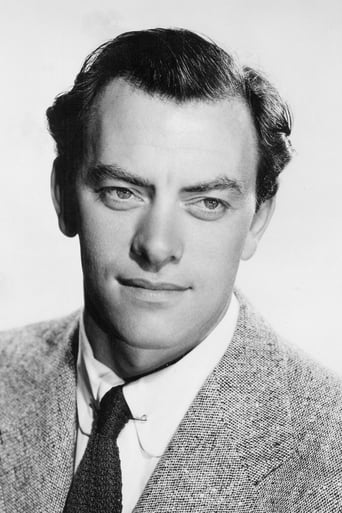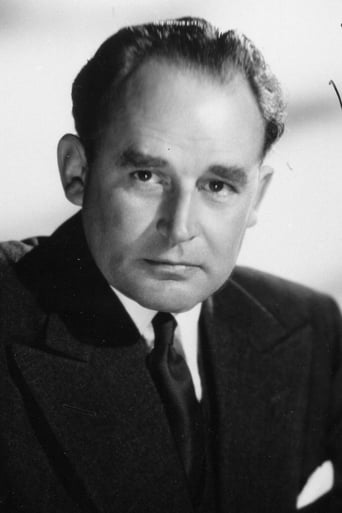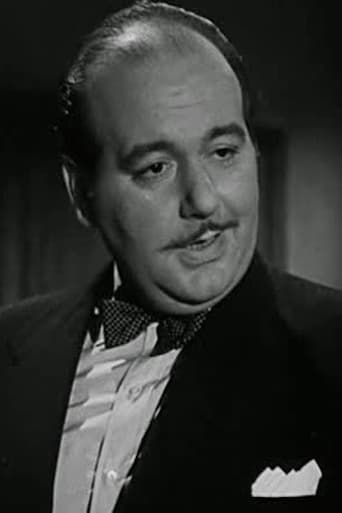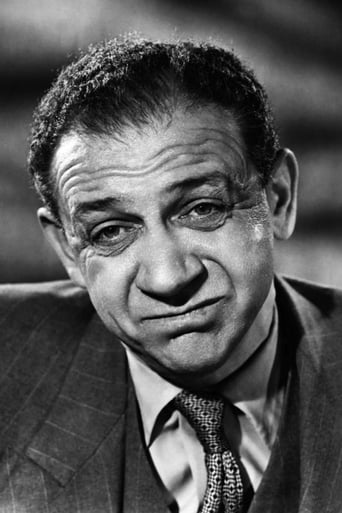Nessieldwi
Very interesting film. Was caught on the premise when seeing the trailer but unsure as to what the outcome would be for the showing. As it turns out, it was a very good film.
Brainsbell
The story-telling is good with flashbacks.The film is both funny and heartbreaking. You smile in a scene and get a soulcrushing revelation in the next.
Ariella Broughton
It is neither dumb nor smart enough to be fun, and spends way too much time with its boring human characters.
Hattie
I didn’t really have many expectations going into the movie (good or bad), but I actually really enjoyed it. I really liked the characters and the banter between them.
jamesraeburn2003
A travelling showman called Pel Pelham (John Ireland) calls on his close friend, the bookmaker Tony Lewis (Sidney James), to discover that he is being blackmailed by a former girlfriend who calls herself Dolores. As he is engaged to be married he does not want to bring the police in for fear his wife-to-be will call off their engagement. So Pel agrees to pay the girl a visit to try and get her off Tony's back. In return, Tony puts up the money for Pel's latest act. By chance, Dolores's address is the same apartment block where the star of Pel's show lives, Henri Sapolio (Eric Pohlmann), 'The World's Famous Starving Man', who locks himself in a glass tomb and fasts for seventy days. Pel calls on Dolores and recognises her as the daughter of a famous circus owner who gave him his first job. She has had an argument with her father and has run away to London where she is struggling to make a living so has resorted to blackmail. That night as Pel and Sapolio hold a celebration party with all their circus friends to mark the opening of their new act, someone calls on Dolores at her flat and kills her. Sapolio is a chief witness since he saw the figure of a man on the darkened stairway enter her flat. But, the Scotland Yard man, Inspector Lindley (Liam Redmond), considers everyone at the party a suspect. Meanwhile, Rorke (Sidney Tafler) tries his hand at blackmailing all the principal suspects. Two more deaths follow at the circus, Tony and Sapolio, before the killer can be unmasked. Pel and the inspector set a trap by announcing that Sapolio is not actually dead, but in a coma and invite the public to see him being cared for in his cage. But, how and when will the killer make his move and will they catch him in the act?Solid, workmanlike and unpretentious Hammer second feature that is very typical of the kind of stuff the studio was making before they shot to international stardom with the horror films and reinventing that genre in the process. Directed at a fair lick by veteran 'B' picture director Montgomery Tully who succeeds in generating some tension like when Rorke taunts the killer in a tube station and as the latter's mind drifts debating whether or not to push him under an approaching train, the noise from it drowns out Rorke's voice in a suspenseful moment. The killer's identity is known to us from the start so this is no mystery movie, but its attractive and unusual setting of a traveling circus act lifts this likeable little picture to heights well above the average British 'B'. There are many familiar faces in the cast including Eric Pohlmann, best known as the voice of the unseen Blofeld in the early James Bond movies, who provides the humour as the suffering circus performer who makes his living by starving himself for 70 days (really?!) in 'The Glass Cage' of the title. Sidney James is excellent as the straight talking, down to earth and streetwise businessman; Sidney Tafler is noteworthy in one of his many slimy villian roles and the imported American leading man John Ireland is also quite good as Pel Pelham. He is most effective in the scenes with his family like when his young son, Peter, pays more attention to his father's show than his school work longing to be the next Sapolio. Although he loves it that his son is proud of him, Pel wants his son to succeed through his academic work and not be an "outsider" like him in some nice believable insight into his home life. Honor Blackman also offers a pleasant performance as Pel's wife Jenny although, despite being billed second, gets very little to do and is only in a small handful of scenes. Liam Redmond deserves praise as Inspector Lindlay and there is a great little scene where he attempts to plug Pel for information. "Look Lindlay, you do your job and I'll do mine. If I did your job I'd be on the side of the underdog" he says annoyed that he is being asked to spy on his friends. "Sometimes that's a very dangerous dog", Lindley replies. Look out for Sam Kydd as a drunken circus doctor and Bernard Bresslaw's in there too in a small unaccredited appearance. The film benefits from Walter J Harvey's atmospheric camerawork, which takes in some nice London locations around Trafalgar Square and Westminster enhancing the period atmosphere and feeling for place.
malcolmgsw
This film is only 59 minutes long,but it feels as if it has been edited down from 90 minutes.Knowing the producers ,this is not likely.They probably hoped that audiences would not notice the joins.The problem with this film is that so much is just left unexplained.So many actors come and go they each must have been employed for just a day or two.Sid James,receives a blackmail note.John Ireland goes to see the girl and persuades her against going ahead.However subsequently James murders her.In turn he is killed by Sydney Tafler,who has previously roughed up Honor Blackman for no given reason.It would appear that Taffler is arrested.Then Geoffrey Keen kills Eric Pohlman again for no reason.So you just end up scratching your head and wondering what it was all about.
FilmFlaneur
One of the must-sees out of the films produced by Robert Lippert in partnership with UK's Hammer studios. Taking advantage of arrangements favoured by the UK's Eady levy (a state film subsidy established after the war) in 1950, the producer formed a business alliance under which he would provide American acting talent - frequently shop-worn stars or just supporting actors who fancied a profitable trip out of the country - while Hammer would supply the rest of the cast and the production facilities. Together they would split the profits. Famous for his concern with the bottom line, Lippert produced over 140 films between 1946 and 1955, characteristically genre pieces such as I Shot Jesse James or Rocketship XM. For the British deal, most of the films were noir-ish thrillers. None were entirely of the first rank, but they remain never less than entertaining.Noir narratives set in and around carnivals have a small but proud heritage, stretching back to Nightmare Alley and beyond. They frequently juxtapose deformed outcasts of the sideshow with the twisted psychology on show elsewhere. The Glass Tomb concerns Pal Pelham (John Ireland), and his forthcoming attraction Sapolio 'The Starving Man', whose act is to go foodless for 70 days whilst locked, Blaine-like, in a glass booth. "I like being my own boss. I like freaks," says Pal at one point, clearly preferring the company of his performers to some others around him. When big-hearted bookie Tony Lewis (Sidney James, a characteristic performance) asks Pal to speak to a woman who has been blackmailing him, she shortly ends up dead, and the killer thinks Sapolio can identify him. Pal, who previously knew the victim, needs to solve the case. Geoffrey Keen, much more familiar to British cinema-goers from numerous stolid establishment roles, gets to play an unsympathetic role as Stanton the murderer.What's interesting about The Glass Tomb is that it is built almost entirely around recurring displays of appetite and denial. Whether it's Sapolio, greedy at home, and finally poisoned by strychnine-covered ham, or the fridge raid of Pelham's young son, the ticket-booth man secretly coveting his bottle of booze, then those who eat so unconcernedly in front of the incarcerated Starving Man, it's a world clearly defined. At a necessarily less explicit level there's also the carnal desire of Stanton and Lewis for the girl - Stanton's two hours alone with her corpse, for instance, is never explained. Tully manages some striking scenes on a budget, notably the performer's party, held while the body of the freshly killed girl lays undiscovered upstairs in her squalid room. The Glass Tomb has its weaknesses - it could have done with a few more freaks - but is baroque and perverse enough to be better known. Ireland gives an adequate performance, and Honor Blackman, in a demure role, plays his wife. Some will also notice Arthur Howard, the brother of Leslie, later to appear in the minor British nudie cult item Paradisio (1961) in a small part. Part of the Hammer Noir box set series where it enjoys audio commentary.
Carolyn Paetow
John Ireland wanders through this B movie like a penniless child in a nightmare candy store! As a freak-show promoter, he is compelled to bankroll a corpulent carny who, billed as The Starving Man, draws crowds to watch him go foodless for 70 days! Instead of turning on the two like hungry lions, mobs of curious Brits pour continuously forth to goggle the decidedly ungaunt attraction while he shaves, sleeps, and so on. Somehow, two murders occur in the midst of the mess, and so the rub. One has to wonder if the whole production (the movie, not the sideshow) is a joke on the audience, since the film is peppered with crude carnality symbolism and (for the fifties) sly sexual innuendo and double entendre. If one has a taste for oh-so-awful flicks and fool-the-rubes humor, this might be worth a peek.





